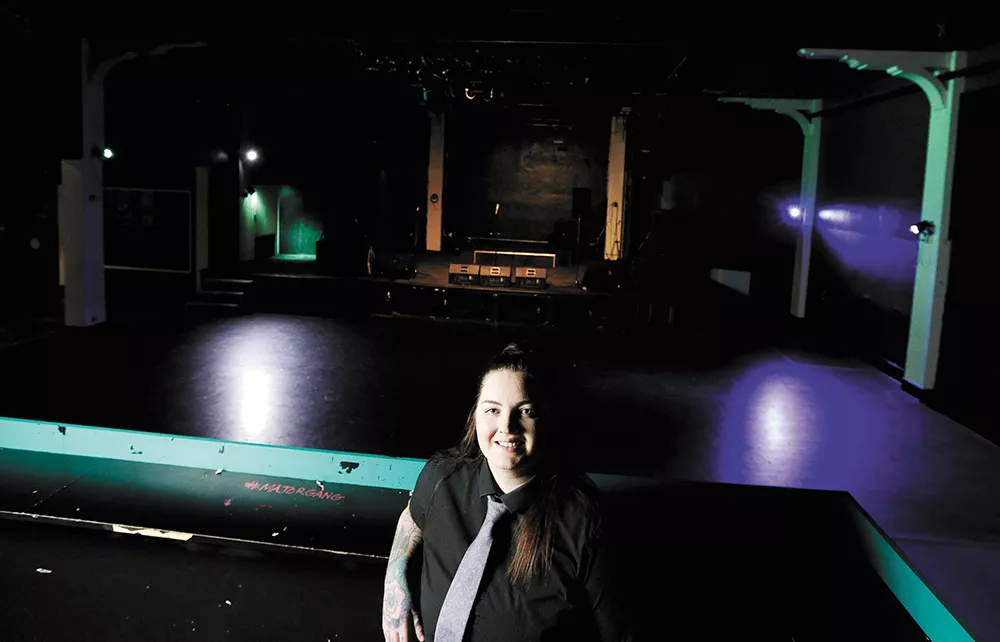When it comes to the music scene in the midst of the coronavirus pandemic, the math is pretty simple: No shows equals no revenue.
Although the statewide closures of bars, clubs and restaurants have only been in effect for a short period, venue owners and artists who are suddenly without money-making gigs are already starting to feel the financial squeeze.
Chelsey Heidenreich, who owns all-ages venue the Pin, says she was as blindsided as everybody else, thinking it would be a temporary hurdle and then watching as the crisis intensified in a matter of days.
"I kind of assumed that I was going to lose out on three to five shows," she says. "The severity of it has gotten to the point that we don't know when we can return. The hardest part is not being able to really prepare."
Heidenreich is one of several local business owners who started up a GoFundMe account for her employees. They're like family, she says, and they're constantly checking in on each other and helping each other out until they're able to get back to work.
"The whole music industry is kind of a little bit of standstill right now," she says, "which is a really scary spot for a lot of people."
Dawson Hoerner, who owns the Big Dipper with her husband Dan, has a slightly smaller operation than the Pin: It's typically just the two of them running the place, doing everything from taking tickets at the door to tending bar, with a handful of folks who occasionally help out on a given night.
"Our main concern is the health of the community, obviously. Anything beyond that feels selfish to worry about too much, really," Hoerner says. "But we do have a business, and we're absolutely a mom-and-pop [operation]. We rely on the Dipper for our income."
The Hoerners have currently postponed all upcoming shows for the time being, hoping everything that was on the calendar for March and April will eventually be rescheduled.
"Now it's just a waiting game," Hoerner says. "And I want to wait till it's safe, because I don't want to be a place where people come and get sick."
Blake Braley, a popular Spokane R&B musician, relies on live gigs, including a weekly residency at the downtown bar Zola, for most of his income. He's preparing to drop an EP next month with a release show at the Lucky You Lounge, and he's keeping his fingers crossed that clubs will have the all-clear to reopen by then.
"I'm trying to stay optimistic, but I'm definitely feeling the crunch financially," he says. "As far as other people, the vibe that I've gotten has been more of a bummer than anything."
But he has also seen artists rallying behind one another: He points to local musicians who have been putting on makeshift performances and live streaming them through their social media profiles, as well as broadcasting their Venmo information and accepting donations.
Lindsay Johnston, a Spokane musician who fronts the blues-rock project Vanna Oh!, was set to embark on a 30-date tour the first week of April. It took nearly six months to set the whole thing up, and now it's looking less and less likely it will even happen.
"I've kind of gone through the stages of grief with it," Johnston says. "I had the disbelief and then the anger, and then the numbness and the sadness. Now I'm at this place of acceptance and trying to find the good in it."
Having worked as a bartender for years, Johnston decided to turn her music into a full-time job last year, and she and her band were on the road. She has also ordered $1,000 worth of merchandise that she planned to sell while touring, and now it seems like she'll be sitting on that inventory for the foreseeable future. But as news of the closures hit, Johnston says her primary concern was for her friends in the service industry, many of whom are without work right now.
"I'm seeing through social media that peoples' work is getting canceled, and I'm like, 'I'm about to be right there with you,'" she says.
The future may be uncertain right now, but nobody wants to let the music die. For Heidenreich, who has been booking shows in Spokane since she was a high schooler, hitting the pause button has been understandably difficult.
"It's heartbreaking," she says. I've been trying to build this since I was 15 years old. I'm only two years in with the Pin, and it's really hard not knowing what the future holds. Everyone's in a bad situation."
In order to get through that bad situation, she says, it's dependent on everyone within the music scene — artists and bookers and fans alike — to step up as soon as doors reopen and regular business operations resume.
"When this all blows over, go out and support local," Braley concurs. "Going to shows is going to be really important. It's been a good reminder of how lucky I am to have a place to play every single week."
"I just hope people come out and they try and spread the love around," Hoerner says. "It's such a small scene anyway. And it's a difficult business even in good times. ... If people want there to be an eclectic scene and more than just a couple places to see music, [they should] broaden their scope, and go somewhere they don't usually go."
And one of the possible side effects of a live music drought is that once the dry spell is over, people will hopefully be as anxious as ever to get out and support their favorite local artists.
"Everyone's gonna be ready to hear live music, have new music to share and just be so grateful for the opportunity," Johnston says. "Once we have something taken away from us, we realize how important it is." ♦


